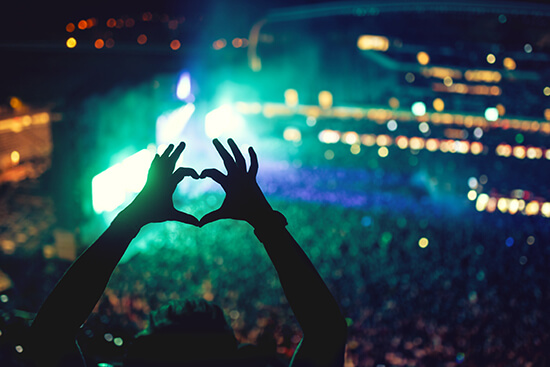
This past month, I was at E3 2016 and couldn’t help but notice something amazing: Despite being surrounded by the latest technology and unreleased video games, crowds congregated around the bands and singers performing live music.
In fact, there were more stages with live music this year than I’ve seen in recent years.
It’s a trend I’m delighted to see more and more at trade shows, conventions, and other live events.
The importance of music in marketing is something people tend to forget about.
It has the power to move an audience in ways other communicative mediums simply can’t.
The Music Fallacy
I grew up playing music in bands with my brothers.
We still play on occasion.
When we were young, we invested a lot of money in amplifiers, turntables, and the biggest, baddest speakers.
I know my kids and their friends have never heard a complete album or playlist on high-fidelity speakers.
Millennials experience most music through earbuds.
Because of this, marketers seem to believe that music has become a playlist relegated to the background.
However, it represents a huge opportunity in the live event space.
In fact, Nielsen found that 91 percent of the U.S. population spends more than 24 hours per week listening to music.
There are certainly leaders in various industries who recognize the power of music and use it in commercials and campaigns to convey their messages.
(Remember those awesome iPod silhouette commercials?)
Most industries, however, aren’t using music as effectively as they could.
Some businesses do consider it briefly, defaulting to whatever’s popular at the moment.
Is that really how you want your brand to be known, as a one-hit wonder?
Make It Personal
I’m a person who deeply cares about guest experiences.
I always think about live events holistically, not just as a podium, mic, PowerPoint, or arrangement of chairs.
I think all event marketers are in a great position to craft a memorable live experience by using music to take their guests and customers on an emotional journey.
Whether it’s folk, country, rock, hip-hop, or EDM, music can help tell your story, and that can be deeply enriching for a brand.
As an example, my youngest daughter was recently listening to the movie soundtrack for “(500) Days of Summer”, and she fell in love with a bunch of classic songs I thought she’d never discover.
For her, the music speaks to the spirit and adventure that summer is all about.
We saw the same thing with the movie, “Guardians of the Galaxy.”
The movie featured classics like “O-o-h Child” by the Five Stairsteps, and “Come and Get Your Love” by Redbone.
Those songs are a running theme throughout the entire movie, and irrefutably contributed to its success.
From a corporate standpoint, my company just finished working with a great composer by the name of Darren Fung.
He scored the entire soundtrack for a visitor center we’re working on in Banff National Park.
It’s emotional and transformative, but most importantly, it takes guests on an epic journey.
Using Music in Marketing to Your Advantage
Try this.
Write down 10 songs that reflect your company.
Gather a group of employees to do the same.
Brainstorm the crossovers, and you’ll quickly find a whole new world of ways to get your brand message across beyond tweets, blog posts, and Instagram photos.
Find your theme, beat, or dance groove, and start building your company soundtrack.
Don’t just download some session music and slap it on your next live event, commercial, or campaign.
It sounds generic, and it takes away the emotional connection that can be so powerful for your audience.
Start with your mission statement, goals, product, and positioning, and create a soundtrack for that.
Apple is a tech company, but it doesn’t use high-tech scores because its brand is more about fostering an emotional connection than the electronics behind it.
TV networks, movie production studios, and even companies as diverse as Intel and Farmers Insurance have signature melodies or notes we associate with them.
This wasn’t by accident.
Music is one of the most important branding experiences you can create.
As you plan your next campaign or event, put some thought into how music in marketing might work.
Reach out to composers, bands, and other musical acts to create an inspiring experience your audience won’t soon forget.